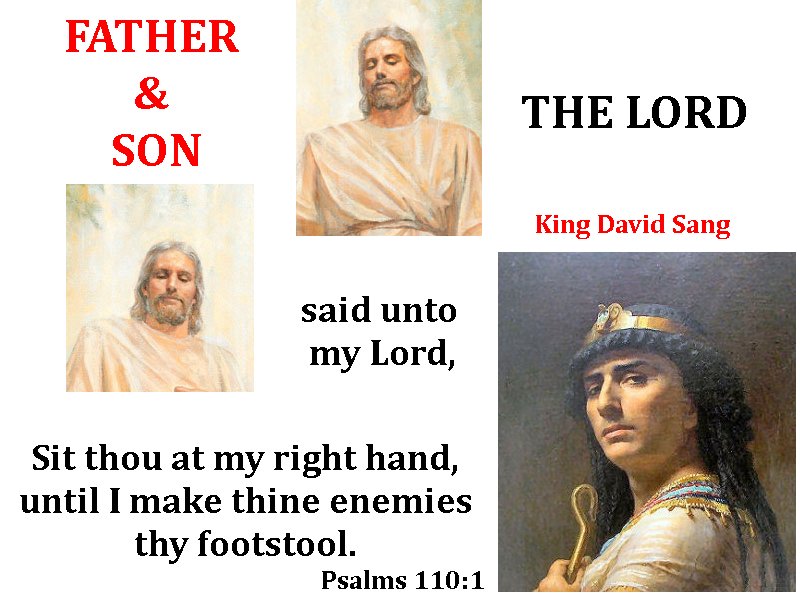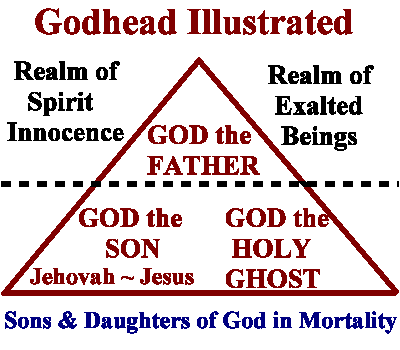Scripture Verse
(Paraphrase)
|
Commentary
|
Footnotes
LDS ~ Added
|
 CHAPTER 110
CHAPTER 110

A Messianic Psalm of David—Christ shall sit on the Lord’s right hand—He shall be a priest forever after the order of Melchizedek.
A Psalm of David.
|
Many of the Psalms are attributed to David. Perhaps David set the verse
and even the music, but the text we have to assume was based in the
scriptures of Israel, just as our own hymns are based upon the scriptures.
|
David was not formally a Prohet, yet he did speak by the power of the Holy
Ghost as pointed out by Jesus. Often the writers of the Psalms did base their
understanding upon the scriptures of God. Thus Psalms is scriptural similar
to how our hymn book or 'green' scriptures are scritural, pharaphrasing,
singing and quoting the words of God in praise of him.
|
1 THE
aLORD• said unto my bLord•, Sit thou at my cright• dhand, until I make thine eenemies thy footstoola.
1. God the Father said unto the Son, Sit thou at my right hand, until I make
thine enemies thy footstool.
The Hebrew Bible uses 'la' or 'el', the shortened form of 'elohyim' for 'Lord',
and 'yehvah' or Jehovah for 'LORD'. But it is clear that the persons being
referred to are the Father and the Son.
Messiah Is Whose Son?
¶ While the Pharisees were gathered together, Jesus asked them, Saying, What
think ye of Christ [the Messiah]? whose son is he? They say unto him,
The Son of David.
He saith unto them, How then doth David in spirit call him Lord,
saying, The LORD said unto my Lord, Sit thou
on my right hand, till I make thine enemies thy footstool?
If David then call him Lord, how is he his son?
And no man was able to answer him a word,
neither durst any man from that day forth ask
him any more questions. ~ Matthew 22:41-46
Here Jesus not only corrected them as to the Messiah being the Son of David,
but he further actually answered them that question which he asked them.
"Whose son is he?" And that answer may be deduced from that passage which
David spoke, that his Lord, Jehovah/Jesus Christ, had a LORD above him, who
was in fact his father. He was the Son of God.
|
The Lord of David and of the Old Testament is Jehovah, the Son. When David
states 'my Lord', he references Jehovah the Son of God. And the 'LORD' here
is clearly the Father, who had called and anointed the Son to be God the Son.
Lost to the Jews today is that both the Old and New Testament Jews understood
well that there was to be the Son of God, David's and their own Lord, who was
called an anointed as Christ. Jesus and the apostles use this psalm to
present the concept of the Father and the Son in the noted verses.
|
1a Mark 12:35-37; Luke 20:41-44
b Acts 2:32-36
c Heb. 1:13
d TG Celestial Glory
e TG Enemies
a Isa. 66:1; Matt. 5:35
TG footstool
The 'natural world' under the influence of Satan will be subdued as the
'earth' is the Lord's. All sin and the wickedness will be destroyed.
Only the sanctified will remain.
|

|
|
It is of a curious consideration that in the three quotations of this first
verse of Psalms 110 found in Mark, Luke and Acts, that the Greek words of
kyrios (kurios) and kyrio (kurio) are used for LORD and Lord respectively.
The Jewish writers of the New Testament seem to not have refered to the
verse by the name Jehovah or adonai at all, Rather they use the same Greek
work with the only distinction being that the Father received an 's' at the
end of his title implying that he is the greater 'God'. And in the three
reference, Christ, the Messiah, is clearly referenced by the lesser name
without the 's' ending which yielded LORD over the non-'s' form which denotes
of lower status or subjection to the higher LORD. And David states the his
Lord is the one who is subject to the greater LORD, whois the Father.
|
|
2 The LORD shall
send the arod• of thy
strength out of Ziona:
ruleb thou in the midst of thine
enemies.
God the Father shall send the rod, the rod of ironc,
the Word of Godd, the Son,
who is our strenght, out of Zion to rule in the midst of thine enemies.
Today's Hebrew Bible here makes 'the rod of strength' sending out the LORD,
'yehvah'. They seem to move 'yehvah' about, failing to distinguish clearly
between Father and Son, perhaps purposefully.
|
Despite of some ill conceived notions that the 'rod' refers to someone
other than Jesus Christ, it is obvious that the 'rod' is no one other than
the Word, that is Christ the Son, and no one else. The 'rod' which is the
strength of God is the 'iron rod' which is the Word of God. And the Word
of God is the Messiah who will rule and reign out of the latter-day Zion by
the word of his power, which is the power of God. Jehovah, who is Christ,
was ordained and anointed by the Father to the position of God, being a
member of the Godhead in the preexistence. He received the fulness of the
Father and operates by the power of God.
|
2a Isaiah 11:1;
Isaiah 53:2(1-3);
D&C 113:3(3-4);
a TG Zion D&C 58:7 AoF 10
b TG rule Rev. 2:27 D&C 133:61
c TG rod Ps. 2:9 1 Ne. 11:25
d TG Word John 1:1 Moses 1:32
Word of God Rev. 19:13
Word of the Lord Psalms 33:6
Rod of Iron
Stated as the rod of iron in Psalms 2:9, the rod has a consistent meaning in
the Book of Mormon, being the 'word of God'. The Word or Word of God is
Christ and by that power was creation effected. And by that power will he
rule in the Millennium.
|
3 Thy people shall be willing in the day of thy power, in the beauties of holiness from the womb of the morning: thou hast the dew of thy youth.
Thy people, the saints, shall be willing in the millennial day of thy power,
in the beauties of holiness from the womb of the morning; thou hast the dew
of thy youth.
|
By whatever name, righteous Israel, the saints of God, sons and daughters of
Christ, or the covenant children of Abraham; the people of the Lord are
active, aiding in the day of the Lord's powera.
Christ was the firstbornb of
the Father in the spirit and he has obtained the 'dew' or blessing of such
birth, becoming the greatest of all God's children, the rightful heir of the
Father, our advocate before the Father.
|
3a TG Day of the Lord
Much could be said about the 'great and dreadful day of the Lord and his
second coming. He will come in power and glory to rule an reign. It will be
a great day for the true followers of Christ and a dreadful day for the
wicked.
b TG Jesus Christ, Firstborn
|
4 The LORD hath asworn, and will not brepent•, Thou art a cpriest for ever after the order of dMelchizedek.
God the Father hath covenanteda, and
will not change it, Thou, Jehovah, are a priest forever after the order of
the King of Righteousnessb.
|
God established his everlasting covenant with man to provide
a redeemer. Jehovah as Christ is that redeeming High Priest of the
covenant. He is the King of Righteousness. The priesthood is after the
order of the Son of God, the King of Righteousness, which Melchizedek means.
God will forever keep his covenant. It is man, who swears vainly, as he
brakes his end of the oath.
|
4a TG Oath
b 1 Sam. 15:35 Ps. 135:14
c TG High Priests
TG Jesus Christ, Prophecies
TG Priesthood, Melchizedek
d TG Jesus Christ, Type/Anticipation
a TG Covenants
b BD Melchizedek
|
|
5 The
Lord at thy right handa shall
strike through kings in the
day of his wrathb.
God the Son, occupying his 'right hand' position in the Godhead, will strike
through the wicked rulers of the earth in the day of the Lord's wrath, the
Second Coming.
The Hebrew Bible here uses 'adonai' (adhonay) in reference to the Lord,
the Son
of God. Adonai is commonly used to avoid the too frequent use of the name of
God and it simply means Lord or Master.
|
God the Father placed his first born spirit son, Christ-Jehovah, in
position at his right hand. Christ was anointed and ordained with the
fulness of the powers of the Father and given the fuller title of 'Jehovah is
Salvation' or Jehoshua. So endowed, the Son of God, by the power
of God, created the heavens and the earth. He became the mediator between man
and the Father. As such, Christ-Jehovah was the God of the Old
Testament. a God of 'Spirit' prior to his birth in the flesh. And at the
Great and Dreadful Day of His Second Coming, the wrath of God will be poured
out upon the wicked by his hand.
|
5a TG Godhead
TG Right Hand
b TG Day of the Lord
TG Jesus Christ, Second Coming
TG Wrath

|
6 He
shall judgea among the heathenb,
he shall fill the places with the dead bodies; he shall wound the heads over many countries.
God the Son shall judge amoung the heathen, the
ungodlyc, He shall fill their
streets with their wicked dead bodies, He shall wound the evil heads over
many counties.
|
Without understanding, the judgements of God seems harsh. Consider, it is
the wick who will be destroyed. They are terrorist
who murder the innocent. These are they who are ripe in their
iniquity and deserve such punishment. These are they who are not Christ
like but evil. They receive the fate of justice, having not repented
in the day of their probation whereby Christ might remove their sins.
|
6a TG Jesus Christ, Judge
b TG Heathen
c TG Ungodly
TG Wicked
The wicked are better off dead than living in thier gross and sinful state.
They will go to 'spirit prison' where they will be taught the gospel,
hopefully preceive things in their proper perspective, repent and come unto
Christ.
|
7 He shall drink of the
brook in the way: therefore shall he lift up the head.
God the Son shall drink of the 'bitter cup' of the performance of the
atonement in life; and therefore the 'Beloved Son'
[David]a, shall he be
raised up as exalted God [head, lead or highest position].
~ A simple verse with much meaning. ~
|
Along the way, in the meridian of time, Jehovah, the Son of God, came
to earth to obtain a body of flesh and bone and to effect his earthly mission.
He performed the atonement and drank of the brook of life, suffering the
atonement and death. He was lifted up and he lift up his head to heaven,
having completed the work given him to do in providing salvation.
He will reign as King of the earth.
|
7a
Jeremiah 23:5-6
Jeremiah 30:8-9
Ezekiel 34:23-24
Ezekiel 37:24
Hosea 3:5
Isaiah 9:6-7
Isaiah 16:5
Isaiah 55:3
Acts 13:33-34
The Lord will be raised up to reign in the Millenium. If one does
not understand that one of His names is 'David', important scriptures are
lost to our understanding. David means 'Beloved', which is one of the names
of Jehovah.
|
|
|
 CHAPTER 110
CHAPTER 110


